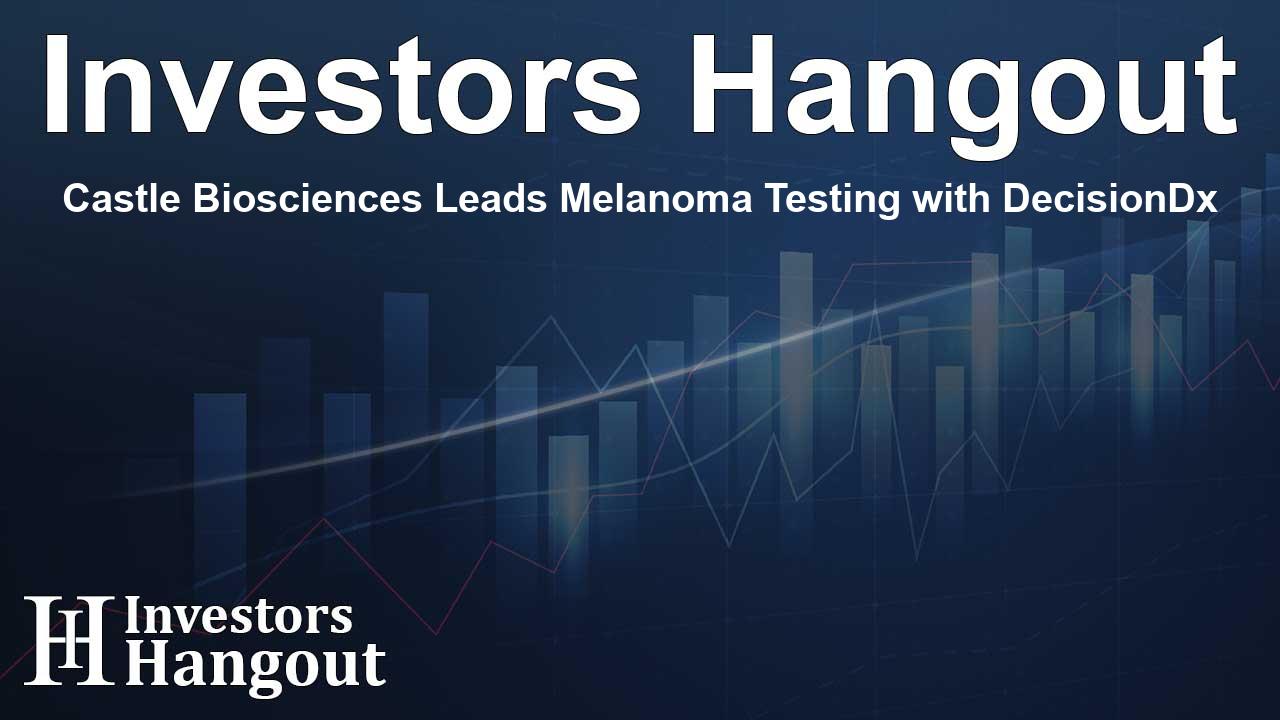Castle Biosciences Leads Melanoma Testing with DecisionDx

Castle Biosciences’ Innovative DecisionDx-Melanoma Test
Patients identified as low risk by DecisionDx-Melanoma have a strikingly low sentinel lymph node (SLN) positivity rate of just 2.8%. This rate is significantly lower than the threshold of 5% established by the National Comprehensive Cancer Network (NCCN) for considering sentinel lymph node biopsy (SLNB). The recent findings published underscore the potential of this groundbreaking test in melanoma management.
Understanding the Importance of SLNB in Melanoma
SLNB plays a crucial role in determining whether melanoma has spread to nearby lymph nodes. Current NCCN guidelines suggest that if the risk of a positive node is lower than 5%, patients might forgo the SLNB procedure altogether. When dealing with T1-T2 tumors, many patients – over 90% – receive negative results from SLNB, indicating a need for more effective risk assessment tools for low-risk patients. With the right approach, patients can avoid unnecessary surgeries while still ensuring their well-being.
Study Findings and Implications
Castle Biosciences, Inc. (Nasdaq: CSTL) recently announced the publication of an important study in a reputable medical journal. The research illustrates how DecisionDx-Melanoma significantly outperforms both the American Joint Committee on Cancer (AJCC) staging and the CP-GEP test. This performance positions DecisionDx-Melanoma as a vital resource for identifying patients at low risk of SLN positivity.
Peter A. Prieto, M.D., MPH, who led the study and is a surgical oncologist, emphasized the need for tests like DecisionDx-Melanoma that accurately gauge the risk of metastasis. He confirmed that this test excels in providing substantial risk stratification, which is essential for making informed treatment decisions.
What Makes DecisionDx-Melanoma Stand Out?
The DecisionDx-Melanoma test integrates tumor biology with clinical features, helping to provide a detailed risk profile for patients. It offers insight into individual chances of SLN positivity and recurrence risks, empowering both patients and healthcare providers to make better-informed management choices. This level of personalization is key in cancer care, where understanding the specific characteristics of a patient’s condition can lead to improved outcomes.
Performance Comparison with Other Tests
In a comparative analysis, the study revealed that while patients classified as low risk by CP-GEP had an SLN positivity rate of 6.2%, those identified as low risk by DecisionDx-Melanoma had a mere 2.8% positivity rate. This striking contrast highlights the superior accuracy of the DecisionDx test, adding weight to the argument for its use in clinical practice.
Confidence in Treatment Decisions
Matthew Goldberg, M.D., Senior Vice President of Castle Biosciences, shared that the findings not only support clinical decision-making but also affirm earlier study results showing high recurrence-free survival rates for patients with low-risk DecisionDx-Melanoma results who chose to forgo SLNB. This strong correlation gives both clinicians and patients the confidence they need when making pivotal treatment choices.
About Castle Biosciences
Castle Biosciences is dedicated to revolutionizing patient care through innovative diagnostic tests. The company’s primary aim is to enhance health outcomes by focusing on tests that provide clear insights into various medical conditions, including skin cancers, uveal melanoma, and other severe diseases. Their ongoing research and development initiatives focus on high-need areas such as moderate-to-severe atopic dermatitis and mental health conditions.
With more than 200,000 tests ordered for cutaneous melanoma, the value of the DecisionDx-Melanoma test is supported by an extensive body of peer-reviewed studies, reinforcing its role in personalized patient management. Interested parties can learn more about the company and its offerings at www.CastleBiosciences.com.
Frequently Asked Questions
What is the significance of the DecisionDx-Melanoma test?
The DecisionDx-Melanoma test is significant as it accurately assesses the risk of sentinel lymph node positivity in melanoma patients, helping guide treatment decisions.
How does DecisionDx-Melanoma compare to other tests?
Clinical studies show that DecisionDx-Melanoma outperforms both AJCC staging and the CP-GEP test in identifying low-risk melanoma patients.
What are the benefits of forgoing sentinel lymph node biopsy?
By identifying patients with low risk for lymph node positivity, DecisionDx-Melanoma allows them to avoid unnecessary surgical procedures, reducing risks associated with surgery.
How prevalent is melanoma treatment with DecisionDx?
Castle Biosciences has seen over 200,000 tests ordered for patients diagnosed with cutaneous melanoma, reinforcing the test's clinical value in current practice.
What other conditions does Castle Biosciences address?
Castle Biosciences also works on tests for various cancers, Barrett's esophagus, and mental health disorders, demonstrating broad applicability in diagnostics.
About The Author
Contact Thomas Cooper privately here. Or send an email with ATTN: Thomas Cooper as the subject to contact@investorshangout.com.
About Investors Hangout
Investors Hangout is a leading online stock forum for financial discussion and learning, offering a wide range of free tools and resources. It draws in traders of all levels, who exchange market knowledge, investigate trading tactics, and keep an eye on industry developments in real time. Featuring financial articles, stock message boards, quotes, charts, company profiles, and live news updates. Through cooperative learning and a wealth of informational resources, it helps users from novices creating their first portfolios to experts honing their techniques. Join Investors Hangout today: https://investorshangout.com/
The content of this article is based on factual, publicly available information and does not represent legal, financial, or investment advice. Investors Hangout does not offer financial advice, and the author is not a licensed financial advisor. Consult a qualified advisor before making any financial or investment decisions based on this article. This article should not be considered advice to purchase, sell, or hold any securities or other investments. If any of the material provided here is inaccurate, please contact us for corrections.
